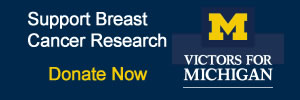Breast Cancer Awareness
Cancer genetics is something we hear a lot about as celebrities such as Angelina Jolie have made medical decisions due to genetic predisposition for cancer. But how do you know if you might have a cancer causing gene? Oncologist and Director of the University of Michigan Cancer Genetics Clinic, Elena Stoffel, M.D., shares the ins and outs of when, who and if you should have genetic testing. Read/download the cancer genetics transcript.
Breast cancer is the most common cancer among American women, except for skin cancers.
We offer the following articles about breast cancer research, treatment and treatment decision-making, survivorship, coping and more:
 What To Do When You're Diagnosed with Breast Cancer
What To Do When You're Diagnosed with Breast Cancer
When a person is diagnosed with breast cancer, information comes quickly.
Before the news can sink in, a procession of physicians from different specialties follows -- with each doctor sharing a mountain of information using a new (and sometimes scary) vocabulary.
“It’s overwhelming,” says Aki Morikawa, M.D., Ph.D., a medical oncologist who sees patients with breast cancer at the University of Michigan Rogel Cancer Center. “That’s how I describe the hours and days after a patient first hears she has breast cancer.” Continue learning what to do after a breast cancer diagnosis.
 What Women Should Know About Breast Density
What Women Should Know About Breast Density
What is Breast Density?
Breast density is defined as the ratio of fat to fibroglandular tissue in the breast.
Radiologists characterize each mammogram into one of four levels of overall density: almost entirely fatty, scattered areas of fibroglandular density, heterogeneously dense, and extremely dense. Read more about breast density.
 Breast Cancer Prevention Tips
Breast Cancer Prevention Tips
Whether you have a genetic predisposition or not for breast cancer, there are changes anyone can make to reduce risk of the disease.
Breast cancer is the most commonly diagnosed cancer in the United States, representing 15 percent of diagnoses. Some 12.4 percent of American women will be diagnosed with breast cancer in their lifetimes, and an estimated 40,000 women will die of breast cancer in 2017, according to the National Cancer Institute. Read on for Breast Cancer Prevention Tips.
 Breast Cancer Genetic Testing
Breast Cancer Genetic Testing
If you have a family history of breast cancer, you may also be at higher risk of developing the disease. This knowledge can boost surveillance and prevention efforts.
One in 8 American women will be diagnosed with breast cancer in her lifetime. Among all cases, about 10 percent are caused by the inherited genetic alterations BRCA1 and BRCA2.
But many at-risk women don’t know they’re predisposed. Continue reading about genetic testing.
 Breast cancer screening
Breast cancer screening
Different health care organizations have adjusted their recommendations for breast cancer screening in recent years. That has led to confusion about whether annual mammograms are necessary for women over 40 -- and whether women should do self-exams of their breasts. Get all the information you need about breast cancer screening.
 Men and Breast Cancer
Men and Breast Cancer
There is no question that breast cancer disproportionately affects women -- but we shouldn't be so quick to dismiss the risk to men. As we continue to learn more about the ways our genes influence our cancer risk, involvement of male relatives in genetic counseling and genetic testing can provide important information for your family's breast cancer risk evaluation. So why are men often forgotten? View the myths around men and breast cancer.

